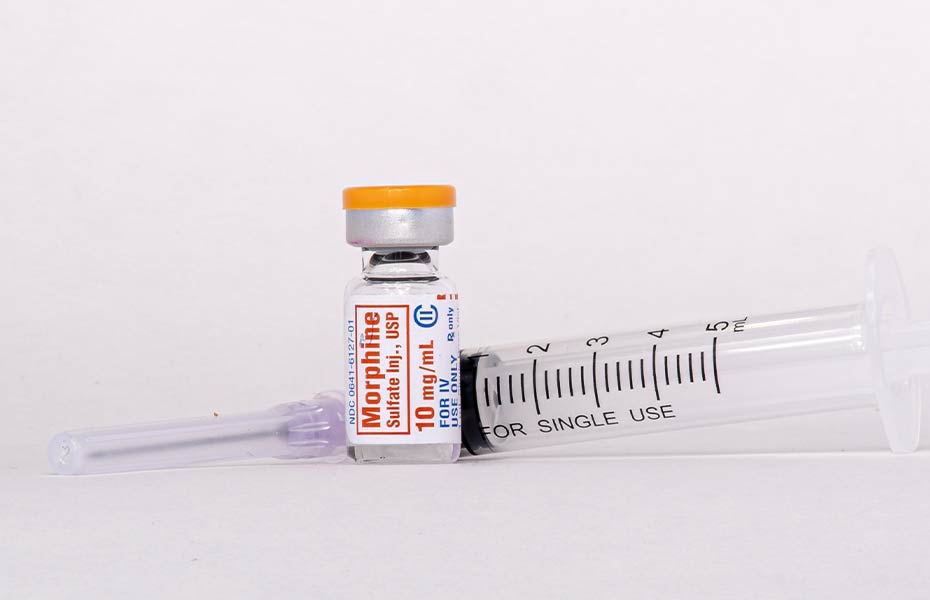Massachusetts Center for Addiction
Morphine Addiction and Abuse

Morphine is an addictive opiate derived from the opium poppy plant. The effects of Morphine are very similar to that of heroin. Healthcare providers prescribe morphine to relieve symptoms of severe pain. However, with its powerful effects comes risks for morphine addiction.
What is Morphine?
Morphine is a powerful painkiller that brings about a sense of relaxation, euphoria, and well-being, making it highly sought after for both medical and recreational use. This dreamlike state can be achieved through various forms, including tablets, syrup, injections, and in some cases, smoking.
While morphine is effective in treating moderate to severe pain, such as after surgery or for cancer-related discomfort, it’s also known for its high potential for addiction.
Morphine Addiction
The pleasurable effects of morphine are tempting, leading many to use it repeatedly. However, this can quickly spiral into addiction. As your body becomes accustomed to the drug, you’ll find yourself needing higher doses to achieve the same effects, a phenomenon known as tolerance.
Over time, both your brain and body adapt to functioning with morphine, creating a dependency that’s hard to break. Trying to stop can trigger severe withdrawal symptoms, leading to a cycle of abuse as you try to avoid these discomforts.
Efforts to curb its addictive potential, such as abuse-deterrent formulations that prevent crushing, snorting, or injecting the pills, have made some impact. However, these measures haven’t eliminated the risk of addiction, especially concerning illicitly manufactured morphine.

Risks for Addiction
Using morphine for a long time or misusing it can lead to addiction because it’s highly addictive. Factors like genetics, mental health issues (like depression or anxiety), and a history of substance abuse can increase the risk of becoming addicted.
Signs of addiction include needing more morphine to get the same effect (tolerance) and experiencing withdrawal symptoms if you try to stop. Morphine addiction is serious and can lead to overdose, breathing problems, and other harmful effects like drowsiness and weight gain.
Minimizing the Risks for Addiction
- Follow prescribed doses strictly and avoid increasing them without medical supervision.
- Be mindful of any personal or family history of substance abuse.
- Seek support from healthcare professionals if experiencing mental health issues.
- Communicate openly with your doctor about any concerns or changes in your condition.
By being aware of these risks and taking appropriate precautions, you can better manage your use of morphine and reduce the chances of developing an addiction.
Recognizing Signs and Symptoms of Morphine Addiction
Morphine addiction can look different for everyone. However, there are some telltale signs. To spot morphine addiction, watch for these signs:
- The person may obsess over getting more morphine, even visiting several doctors to get extra prescriptions.
- Missing work or school, ignoring personal care, and pulling away from friends and family are common behaviors.
- Look for mood swings, secrecy, erratic behavior, or trouble focusing, which can all suggest an addiction issue.
- Small pupils, excessive sleepiness, and slow breathing are physical indicators of opioid addiction.
Effective Treatment Approaches for Morphine Addiction
To overcome morphine addiction, a few key treatments are really helpful:
- Medical Detox is the first step where doctors help you safely stop using morphine, managing any withdrawal symptoms that come up.
- Cognitive-behavioral therapy (CBT) is a type of counseling that helps you understand and change the thoughts and behaviors that led to addiction.
- Medicines like buprenorphine can reduce cravings and make withdrawal easier. It works by affecting the brain in a similar way to morphine but less strongly.
- Talking with a counselor can provide emotional support. Joining a group therapy session lets you meet others going through similar struggles, which can be very comforting and informative.
- Having your family involved in your recovery can strengthen your support network and help fix any strained relationships.
- Activities like yoga, meditation, and acupuncture, in conjunction with traditional treatments, can reduce stress and improve your overall well-being as you recover.
Remember, everyone’s path to recovery is different, so treatments are tailored to fit your specific needs.
Getting Help with Massachusetts Center for Addiction
If you or someone you know is struggling with morphine addiction, remember that you are not alone. The Massachusetts Center for Addiction is here to provide the support and resources needed to overcome morphine addiction. Our team of experienced professionals understands the complexities of addiction and is dedicated to helping individuals reclaim their lives.
Reaching out for help is a courageous step towards recovery. At the Massachusetts Center for Addiction, we offer a range of evidence-based treatment approaches tailored to meet your specific needs. From comprehensive assessments to personalized therapy sessions, our compassionate staff will guide you through every stage of your recovery journey.
Call our admissions team today at 844-486-0671 to get started.





